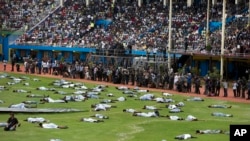Rwanda wants to know how the French government will go about releasing declassified documents relating to the 1994 genocide that left about 800,000 -- mostly minority Tutsi -- dead in a hundred-day massacre.
Rwandan Attorney General Busingye Johnston said his government has asked its diplomatic representative in France to find out more about the government’s plan to release the documents.
“We do not have any official communication on the question of the declassification will happen," he said. "What we read in the media is that it will be in phases or in portions but what kind of portions or where do they come from or what period will they cover? We do not have any information as of now.”
AFP has reported a decision to declassify the papers was signed on Tuesday and that documents relating to Rwanda between 1990 and 1995 are included.
Johnston says Rwanda will subject the declassified genocide documents to a thorough analysis after they are released.
“For us the most important thing is the two questions of the how and the what? How have they been declassified and what have been declassified?" Johnston asked.
“We prefer to wait and see what documents are declassified and how they are declassified. We will obviously subject them to a bit of analysis and then we should have some comments to make at the end of the day,” he said.
Johnston says France’s judicial system could use the declassified documents to pursue alleged perpetrators of Rwanda’s 1994 genocide.
Rwanda has often accused France of complicity in the country’s genocide.
Analysts say the accusations have created lukewarm diplomatic relations between the governments in Kigali and Paris.
Johnston says the two countries could enjoy better relations based on a foundation built on truth and accountability.
“The best relationship is the relationship built on the truth, built on justice, built on a sense of accountability, and it doesn’t matter that this information that would be declassified from Paris, it might produce information that would make some individuals in Paris accountable,” he said.
“To me it shouldn’t matter. The important point to make is we need to build a relationship going forward and we need to build it on the basis of truth and some of this information might be a serious contribution to this truth and justice,” he added.











